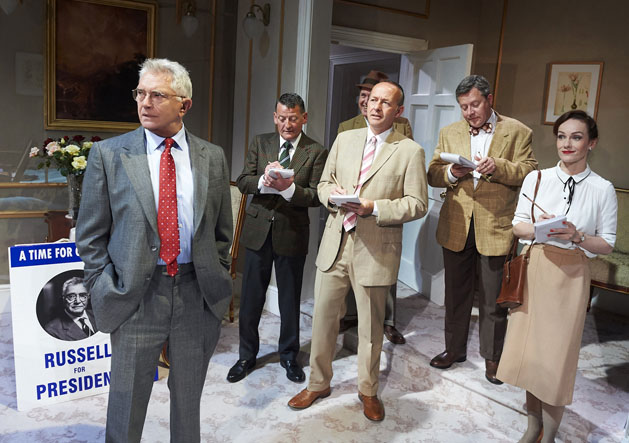
Gore Vidal once quipped that American democracy was ‘bribery on the highest scale’. As an unsuccessful Democratic candidate himself he could quip with some authority. Undoubtedly he had his finger on the pulse of the American political system in 1960, the year in which the play is set and which today, it seems, runs with the same blood types. The play asks a perennial question: what kind of government do we want, or more pertinently, what kind of men or women do we want to rule us? (Classicists will no doubt smile and nod sagely)
The constant tension between the high minded and the visceral is a theme played out, not merely in The USA, but here in the UK, across Europe and wider as populism struts around the world stage. The play, for obvious reasons, is nothing if not timely. The action circles the nexus of expediency and conscience – at times we could have been watching a modern dress version of A Man For All Seasons – and the personal struggle, stubborn or principled depending on ones view, over whether to sacrifice a career (indeed a life in More’s case) for the sake of a principle of conscience. And we have the backdrop of a Democratic convention with swirling rumours of personal indiscretions, marital disharmony and the inevitable web of spin and machination.
Weighty themes require no less of the cast. Martin Shaw brings a career of, amongst many other things, thoughtful cops and judges to his portrayal of Secretary William Russell. Shaw has accumulated a certain authority and weight as an actor and his Russell, learned, thoughtful and principled is perhaps a modern model of the Platonic ideal. Yet his America, one feels, would be good, but directionless, too prone to procrastination. On the other hand his political opponent for the nomination, Senator Joseph Cantwell, is a very Machiavel.
Jeff Fahey’s creation is an alpha male, unencumbered in his decision making, by any conscience. His only morality is expediency and Mr Fahey brings a certain strut and swagger to the part (modern equivalents will not be overlooked) and there is a certain seductiveness in his willingness to do what is necessary to get things done.
Holding the ring in which the two candidates operate is former president Hockstader (Jack Shepherd) a man who still holds some party clout. A political oak with roots in the American people, he is a man on the edge of life with nothing to lose but his legacy. Torn between the two polar, yet necessary, opposites, he is unable to choose and literally gives up the ghost in the attempt.
Gemma Jones, who seems to gain in stature with every role, is, as the redoubtable Mrs.Gamadge, the closest thing the America of the play has to a queen (whom she resembles). She is Mrs. Middle America and might well have coined the notion that when you elect a president you also elect their wife. She is the gatekeeper to the American woman of the day with an authority that is unassailable.
Honeysuckle Weeks and Glynis Barber are the steadfast political wives standing by their man out of a sense of duty and ambition; satellites to the real power yet with a sublunary influence on events not found on this side of the pond. The one earthy and provincial the other sophisticated and metropolitan yet both, chameleon-like, taking on the persona appropriate to their husbands.
If ever a political play had been crying out for revival this was it. It only needs a revival of Jules Feiffer’s Little Murders, which takes a satirical look at casual slaughter in America and the survey will be complete. As Russell says, perhaps adapting Wordsworth, ‘The past is always with us’.
We may sit in the theatre and gloat over what we may consider our superior system, but as we leave the theatre the gloating has to stop. ★★★★☆ Graham Wyles 10th October 2017
Production photo by Geraint Lewis
The Best Man opens at London’s Playhouse Theatre on 24thFebruary for a limited run

